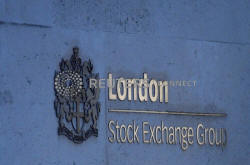Trade war, Brexit stoke debt and dollar, hit stocks and sterling
 Send a link to a friend
Send a link to a friend
 [July 17, 2019] By
Sujata Rao [July 17, 2019] By
Sujata Rao
LONDON (Reuters) - Resurgent trade
tensions, concern over the outlook for corporate America and the growing
risk of a chaotic Brexit in the United Kingdom curtailed appetite for
equities on Wednesday and stoked demand for "safe" government bonds.
U.S. President Donald Trump renewed his threat to tax another $325
billion of Chinese goods, amid nervousness over when the two sides will
resume trade talks. But the United States could also face Chinese
sanctions, following a World Trade Organization ruling on Tuesday.
After surging to record highs recently on Federal Reserve rate-cut
signals, Wall Street has grown nervous this week as big banks reporting
quarterly earnings -- Citi, JPMorgan and Wells Fargo -- have recorded
drops in net interest margins, a sign low interest rates are squeezing
bottom lines.
Bank of America, Bank of New York Mellon, Netflix, IBM and eBay are
among the companies reporting results later in the day and investors
will watch for signals on the profit outlook.
"The market is over-extended. The anticipation is for a lot of liquidity
injections and rate cuts and there's little room in the market for
disappointment in corporate earnings," said Francois Savary, chief
investment officer at Swiss wealth manager Prime Partners.

"If there is disappointment in earnings-per-share, that will drive more
consolidation in the market," he predicted.
(For a graphic on 'World stocks, Treasury bonds' click https://tmsnrt.rs/32xQXf2)
The fear is central banks may find it hard to rescue a world economy
under pressure from the year-long trade conflict -- the latest sign of
which came from Singapore, whose exports sank by the most in six years
in June.
Equity futures for the S&P500, Dow Jones and Nasdaq suggest Wall Street
will open up 0.15% to 0.25%, while MSCI's global equity index held just
off recent 10-day highs.. A pan-European benchmark weakened for the
fourth straight day.
A Fed rate-cut cycle would put further pressure on U.S. bank margins.
Money markets are are 100% priced in for three rate cuts of 25 basis
points each by next March. Some banks, such as Barclays, predict three
cuts by the end of the year.
Those wagers have not budged even after a surprisingly strong U.S.
retail sales report on Tuesday, robust June jobs data and the biggest
rise in New York manufacturing in over two years. In fact, Chicago Fed
President Charles Evans touted a 50-basis-point cut this month.
[to top of second column] |

The London Stock Exchange Group offices are seen in the City of
London, Britain, December 29, 2017. REUTERS/Toby Melville/File Photo

But those expecting three rate cuts this year could be disappointed, Savary
said, because that magnitude of easing would be "compatible with a recession."
Michelle Girard, chief U.S. economist at NatWest Markets, said domestic data
would not deter the Fed.
"The Fed knows the U.S. consumer is strong; policymakers are worried about the
downside risks associated with global growth and weak manufacturing/business
investment, which is why they believe a rate cut is appropriate."
Along with the trade uncertainty and soft equity markets, that kept bonds
well-bid -- U.S. Treasury yields, which rose after the retail data, inched lower
again and German bonds also saw a fall in yields..
(For a graphic on 'Central-banks or Trump' click https://tmsnrt.rs/2NQf858)
STERLING STRICKEN
Fed expectations have not weakened the dollar much. It stood around a one-week
high against a basket of currencies after the previous day's half-percent jump.
The dollar tends to benefit from trade war jitters, but it's backed by higher
interest rates than most other major currencies. It is also getting a boost from
sterling, which is at 27-month lows on fears Britain will tumble out of the
European Union with no trade agreement to soften the blow.
The pound fell further below $1.24, bringing losses this month to almost 2.4%.
It has fallen 8% from its March peak of $1.3383.
(For a graphic on 'One direction for sterling' click https://tmsnrt.rs/2NZstIC)
The euro remains under pressure, after losing 0.4% on Tuesday. Weak business
sentiment data heightened expectations the European Central Bank would cut rates
twice this year from their current minus 0.4% level.

Gold fell 0.2% to $1,403 per ounce. Oil prices stabilized after falling more
than 3% earlier..
(Additional reporting by Tom Arnold in London and Wayne Cole in Sydney, editing
by Larry King)
[© 2019 Thomson Reuters. All rights
reserved.] Copyright 2019 Reuters. All rights reserved. This material may not be published,
broadcast, rewritten or redistributed.
Thompson Reuters is solely responsible for this content. |